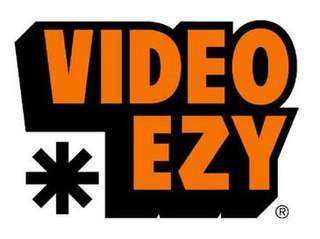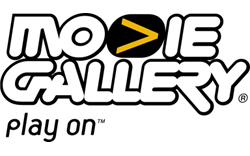Pueblo is a Puerto Rican supermarkets chain. It has been one of Puerto Rico's major supermarket chains since 1955.

A video rental shop/store is a physical retail business that rents home videos such as movies, prerecorded TV shows, video game discs and other media content. Typically, a rental shop conducts business with customers under conditions and terms agreed upon in a rental agreement or contract, which may be implied, explicit, or written. Many video rental stores also sell previously viewed movies and/or new, unopened movies.

Blockbuster formerly called Blockbuster Video is an American multimedia brand and former rental store chain. The business was founded by David Cook in 1985 as a single home video rental shop, but later became a public store chain featuring video game rentals, DVD-by-mail, streaming, video on demand, and cinema theater. The logo was designed by Lee Dean at the Rominger Agency. The company expanded internationally throughout the 1990s. At its peak in 2004, Blockbuster employed 84,300 people worldwide and operated 9,094 stores.
Rogers Plus was a brand name for the retail operations of Rogers Communications. It was formerly two separate brands, namely the Rogers Wireless chain of telecommunications stores previously operated by InterTAN under licence from Rogers, and the Rogers Video chain of video rental stores. In early 2007, Rogers retired the Rogers Video and Rogers Wireless brand names from its stores and re-branded them as Rogers Plus.

Hollywood Entertainment Corp., more commonly known as Hollywood Video, was an American video rental store chain. Founded in 1988, the chain was the largest direct competitor to Blockbuster Video until it was acquired by Movie Gallery in 2005. It ceased operations in 2010, when Movie Gallery declared Chapter 7 bankruptcy.

Video Ezy was an Australian home video rental business that offered titles on VHS, DVD, Blu-ray and Ultra HD Blu-ray, as well as console video games, for rent. At its peak in the mid-2000s, Video Ezy had over 500 company-owned and franchised video rental shops in the country, and owned 40% of the Australian video rental market after taking over Blockbuster's Australian operations. The company also expanded internationally into New Zealand and Asia.
Redbox Automated Retail, LLC is an American video on-demand streaming and video rental company specializing in DVD, Blu-ray, 4K UHD rentals and purchases and formerly video games via automated retail kiosks and TVOD, AVOD, and FAST services via its website, Android and iOS apps, and many consumer electronic devices. Redbox kiosks feature the company's signature red color and are located at convenience stores, fast food restaurants, grocery stores, mass retailers, and pharmacies.
DVD-by-mail is a business model in which customers rent DVDs and similar discs containing films, television shows, video games and the like, ordering online for delivery to the customer by mail. Generally, all interaction between the renter and the rental company takes place through the company's website, using an e-commerce model. Typically, a customer chooses from a list of titles online and adds titles to a queue. As a customer's requested titles become available, the company sends them out. When the customer is finished with the disc, they mail it back to the company.

Movie Gallery, Inc. was the second largest movie and game rental company in the United States and Canada, behind Blockbuster Video. The company rented and sold Blu-ray Discs, DVDs, VHS tapes, and video games. Founded in Dothan, Alabama, the company was headquartered in Dothan, and later in Wilsonville, Oregon.
LoveFilm was a United Kingdom–based provider of DVD-by-mail and streaming video on demand in the United Kingdom, Sweden, Norway, Denmark and Germany.
Jumbo Video is a Canadian brand of franchised video stores. The brand is owned by Le SuperClub Vidéotron, a division of Quebecor Media, which maintained corporate-owned stores until 2018.

Family Video Movie Club Inc. was an American brick and mortar video rental chain serving the United States and Canada. The family-owned company is headquartered in Glenview, Illinois.
Gamestation was a chain of retail shops in the United Kingdom selling used and new video games, and was the second largest specialist video game retailer in the United Kingdom until it was acquired by Game in May 2007, a group which owns many different gaming stores throughout the United Kingdom and Europe. In March 2012, the Game Group went into administration and a number of Gamestation stores, including the company's flagship store in Birmingham New Street were closed.

Hastings Entertainment was an American retail chain that sold books, movies, music, and video games and functioned as a video rental shop. As of 2016 it had 126 superstores, which were mainly located in the South Central United States, Rocky Mountain States, and in parts of the Great Plains and Midwestern states. Hastings Entertainment stores were also located in many college towns in the U.S. Hastings Entertainment was headquartered in Amarillo, Texas.

ChoicesUK was the second-largest chain of DVD and video game rental shops in the United Kingdom - as well as an AIM listed multi-channel distributor and retailer of DVDs, computer games and CDs.

John Antioco is an American businessman, known for being the former CEO of the now bankrupt Blockbuster Video who missed an opportunity to purchase Netflix before it became a multi-billion dollar streaming platform. He is now chairman of the board of directors at BRIX Holdings LLC and the Managing Partner of JAMCO Interests LLC.

Nintendo of America, Inc. v. Blockbuster Entertainment Corp. is a 1989 legal case related to the copyright of video games, where Blockbuster agreed to stop photocopying game instruction manuals owned by Nintendo. Blockbuster publicly accused Nintendo of starting the lawsuit after being excluded from the Computer Software Rental Amendments Act, which prohibited the rental of computer software but allowed the rental of Nintendo's game cartridges. Nintendo responded that they were enforcing their copyright as an essential foundation of the video game industry.

The Last Blockbuster is a 2020 documentary film about Blockbuster LLC's last store, located in Bend, Oregon. It was released on December 15, 2020, by 1091 Pictures.

Blockbuster, colloquially known as the Last Blockbuster, is a video rental store in Bend, Oregon. In 2018, it became the last Blockbuster store in the United States, and in 2020, it became the world's last remaining retail store using the Blockbuster brand.

Video City was an Australian home video rental business that offered titles on VHS, DVD, Blu-ray and Ultra HD Blu-ray, as well as console video games, for rent. At its peak, Video City operated 26 stores nationally; 21 in Tasmania, with a further five stores located across Victoria and Queensland.













